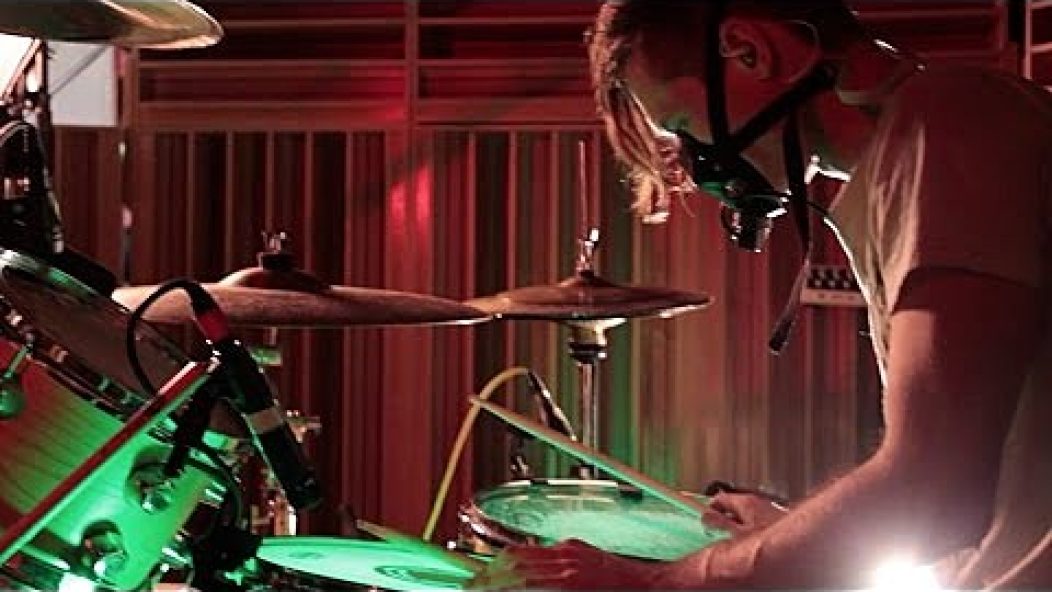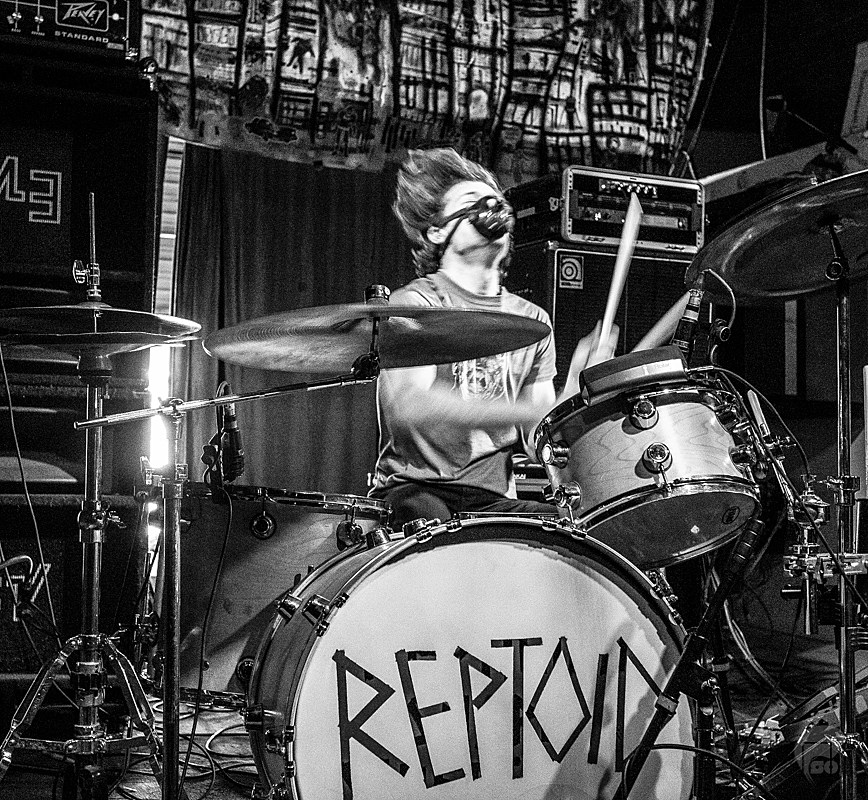
Interview & Song Premiere: Reptoid

…
Reptoid encases feral-yet-precise drumming with noxious clouds of noise and maniacal synth. And it’s just one guy.
The one-man band has historically been a gimmick, usually associated with music that’s better suited to tourist-infested boardwalks than something that warrants close listening. Case in point: those guys who march around with a junkyard of instruments on their backs while squawking like pirates. But Reptoid crafts complex mathcore that rests on the same echelon as that of The Locust, Daughters and Lightning Bolt. While playing dizzying drum patterns in the spirit of Zach Hill, Reptoid mastermind Jordan Sobolew works a mad scientist pedalboard with his left foot and yells into a creepy mask that doubles as a microphone. Like Tristan Shone of Author & Punisher, Sobolew also builds equipment specifically designed for his music.
…

…
Reptoid has slipped under the radar for the most part. But, judging from the two exclusive videos below, that doesn’t seem likely to last. “Overlords” plows forward with an AmRep drive but gets chopped up by glitchy changes; and “Dead Planet” is a collision between high-energy synth blues and grating noise rock.
Sobolew recently sat down with Invisible Oranges to discuss the beast that is Reptoid.
-J.J. Anselmi
…
…
…
What’s the origin story of Reptoid?
I was always one of those kids who wanted to take shit apart just to see how it worked. I used to have a giant duffle bag full of disassembled toys and electronics in my closet growing up. Then I got one of those ‘Home Alone’ Talkboy voice recorders/manipulators, and that fascination became fused with music and recording. When I was old enough to want to play in punk bands with my friends, I became the guy with the four-track that was always recording shitty cassette demos — all the while finding ways to do more with the minimal tools I had at my disposal.
When it came time to find a career, I messed about with art classes for a few years and then moved to Oakland from Fresno to jump into audio engineering school, taking out a bunch of loans I will probably never be able to pay back. From there I learned the fundamentals of audio engineering and studio maintenance electronics. For a lot of students, the studio maintenance class was not their favorite because it delved into electrical theory, circuit design and cable making — very tedious and often uncreative work. I loved that stuff, though. Apparently, I couldn’t get enough of huffing those solder fumes. From there I went on to make a bunch of guitar pedals, synthesizers, circuit-bent noise machines, and studio gear such as preamps, compressors, and high-end condenser mics. At that point I had already been drumming in punk, math, hardcore, and metal bands for over a decade, but I had never combined the two things. I kept building this army of weirdo gear that I thought I would one day use in some kind of solo project, but playing in other bands was consuming enough to never really follow through with that vision.
What motivated you to start a one-man band?
When my last real band, a two-piece called Reptilian Shape Shifters, finished a US tour in 2013, guitarist Alex Woods moved to Brooklyn. I had been playing in bands with Alex since I moved to Oakland. We had a musical and personal relationship that would’ve been difficult to reproduce, so I was forced with the decision to start over again with a new group or finally pursue this weird vision of my solo band. Reptoid is definitely the one-man spinoff of Reptilian Shape Shifters, as I continue with the theme of reptilian humanoids, although we do differ quite a bit stylistically.
I don’t like to say Reptoid is a one-man band because it sounds corny, and I don’t like the image that paints to the uninitiated. It’s not really a ‘solo project’ either, because typically those projects are meant to temporarily occupy musicians in their time apart from their main bands, and they’re often not able to be played live without the aid of others. I just consider Reptoid to be a band that happens to have only one member.
What other one-person projects have inspired you?
As Reptoid, I have always attempted to produce the sound of a full band — not to be written off as some novelty that can only be enjoyed within its limitations. I personally don’t know of many one-person bands that could be considered more than just a project in that same way. I know they’re out there, but I’m only familiar with a few. I would be remiss if I didn’t mention Author & Punisher. I was working sound at Hemlock Tavern in San Francisco years ago when I witnessed a very inspiring and intimate Author & Punisher set to a small crowd. I also have to mention Brian Chippendale of Lightning Bolt and his one-person band, Black Pus. I’m a big Lightning Bolt fan, and I have also had the distinct pleasure of witnessing Black Pus when Reptilian Shape Shifters played shows with him in San Francisco and in Providence while we were on tour. I have a lot of respect for Chippendale, and I really studied his methods of creating sounds on those occasions. While both of those bands gave me a lot of ideas, my own methods are very different.
…
…
It’s easy to tell that there are several things happening when you play, but not to know how you execute it all. Aside from playing drums, what’s going on in a typical Reptoid song?
I think this is probably what most people are wondering when they see a Reptoid set. I’ve heard people hypothesize everything from, “He’s just playing to a backing track,” to “He’s controlling everything with his mouth.” Of course, neither of those things are true. Simply put, lots of loud noises coming out of a drum-triggered synth and sampler, all of which are heavily distorted and manipulated. I’m surrounded by a lot of electronic gear when I play that makes what I do possible as a live performance, instead of pressing play on a laptop.
Can you give a layman’s description of the musical contraptions you’ve built for Reptoid?
My entire setup is like a living ecosystem where every part depends on its neighbors to work in harmony or disharmony. If there’s one kink in the system, it can ruin my whole set, so I’m constantly thinking of more efficient, less accident-prone and more versatile ways to implement my setup. Sometimes I spend a lot more time building and maintaining my rig than I do actually playing it. Many of the devices have been built or customized myself, like my monosynth, a variety of custom effects pedals, the cabling, power supply and mic system. I also use a fair amount of commercial digital effects that I am not able to produce.
On my drum kit, I have triggers on the drums as well as a few extra trigger pads. Each trigger goes to a junction pedal where I can disable them with footswitches. Those then go to a device that assigns them a midi note of my choosing. The midi notes trigger both a mono synth and an MPC sampler where I have recorded guitar, bass, keys, noise, some single notes, short riffs, and loops. I spend a lot of time just creating sounds and capturing them with the sampler. Those sounds then get sent to a large three-tiered pedal board that I control with my left foot. I have a ton of stupid pedals, pitch shifters, lots of fuzz, octave, looping and multi-effects with expression pedals. Each pedal is routed through a midi-controlled switching system where I can disable each one easily with midi program changes. After the pedalboard, the signals go out to the amps, which I tend to drive somewhere between pretty fucking loud and uncomfortably loud. I run a bi-amped system with lows going to bass cabs and mids/highs going into PA speakers. I tried guitar cabs for a while, but I blew them all. For vocals, I have a microphone cartridge in a respirator mask to keep it on my face. That goes through a few pedals, too. Easy enough, right?
…
…
Describe the writing process for Reptoid.
I usually start with either a particular drum part I want to build a song around, or I’ll just have a full session making weird noises until I find one that I want to sample and find a drum part that suits it. Writing can become tedious because I spend an eternity capturing sounds and then editing them and programing with the sampler and pedal controller. Those monotonous tasks can really break up the spark of excitement when birthing a new song. I sometimes wish I could just walk in and start playing drums and let other band members worry about everything else, but there are these little glimmers where toiling away pays off.
Who are some of the drummers that have influenced you most, and what have you taken from those players?
Most of my favorite drummers are not necessarily people you’re going to see on the cover of a magazine. They’re usually players who taught themselves and, through some combination of unconventional technique, ignorance of standard methods, and sheer brute force, have established a unique playing style. Zach Hill is one of those guys for me. People used to know him from the band Hella, but now he’s more well known for being in Death Grips. I love his insanely fast and unending single-foot double strokes on the kick and his seamless integration of hi-hat work amongst what sounds like a wall of fills. His drumming is inhuman.
…
…
Brian Chippendale is another. When I watch him drum, he looks like he could just play forever with the same amount of energy and intensity without ever tiring from the flurry of spastic rolls or relentless kick drum notes. I love watching Greg Saunier of Deerhoof bust into some weird free-time succession of broken fills, only to go right back into a driving beat while banging his head so violently that it looks like he might be using it to hit his cymbals. Gabe Serbian of The Locust is another. Watching him play with matching brutality and technicality through some of the most bizarre song structures—all while squeezing in tons of unique licks and cymbal stops—never gets old. What I’ve taken from these guys is that the energy you put into your music matters. If you play the way you want to play instead of mimicking conventions—and you play hard—it shows in a way that will make an impact on people.
Considering its antagonistic vibe, Reptoid seems like it would inevitably lead to a pretty wide variety of listener reactions.
There’s no getting around it, I make abrasive music. It’s really not all that musical. You cannot simply watch a Reptoid set as a passive stander-by. It’s not something you want to have in the background of your casual night out with friends. I try to make each Reptoid set a performance that envelops the audience, and if you don’t want to be enveloped, you will probably leave. I’m Ok with that. It’s not for everyone. I honestly don’t have the mental awareness to notice what’s happening in the audience while I play. Everyone could be completely vibing with it, or they could all walk out, and I would continue on just the same. I’d be lying if I said I wasn’t surprised that anyone is ever into it. I started this as an experiment to see if I could do it, and I somehow got enough positive reinforcement to continue.
Some of my favorite reactions are the alien and conspiracy-related conversations that I seem to attract. Anyone privy to such things can see that I’ve gone out of my way to involve myself with reptilian conspiracy theories. People who research and think about those conspiracies love to talk about them at length, and I usually love to listen. There have been a few people who have taken it to the extent that they also see themselves as a reptoid in human skin, and I obviously must be a member of their elite species, possibly even a leader of some sort. I welcome those associations, but people should not look to me for any life answers.
What’s on the horizon for Reptoid?
I just made a deal with New York-based heavy and avant-garde label Magnetic Eye Records to do my next two releases. I’ll have a 7” record out sometime this year followed by a tour that will be as long as I can get away with. I’d like to hit both US coasts and a substantial amount of the in-between. My earlier recorded work, which is all that’s been available until now, was made in the first dawning months of Reptoid. I’d like to think that I’ve come a long way in my execution in the last few years, so it will be nice to get some more recent material out on a physical medium. After that, I’ll keep riding this train as far as it will take me. One of the positive aspects of Reptoid is that, unlike most bands that will break up when the members can no longer work together, I can keep doing this as long as I am alive and can conjure the motivation. Conceivably, I could be Reptoid for the rest of my life.
…










